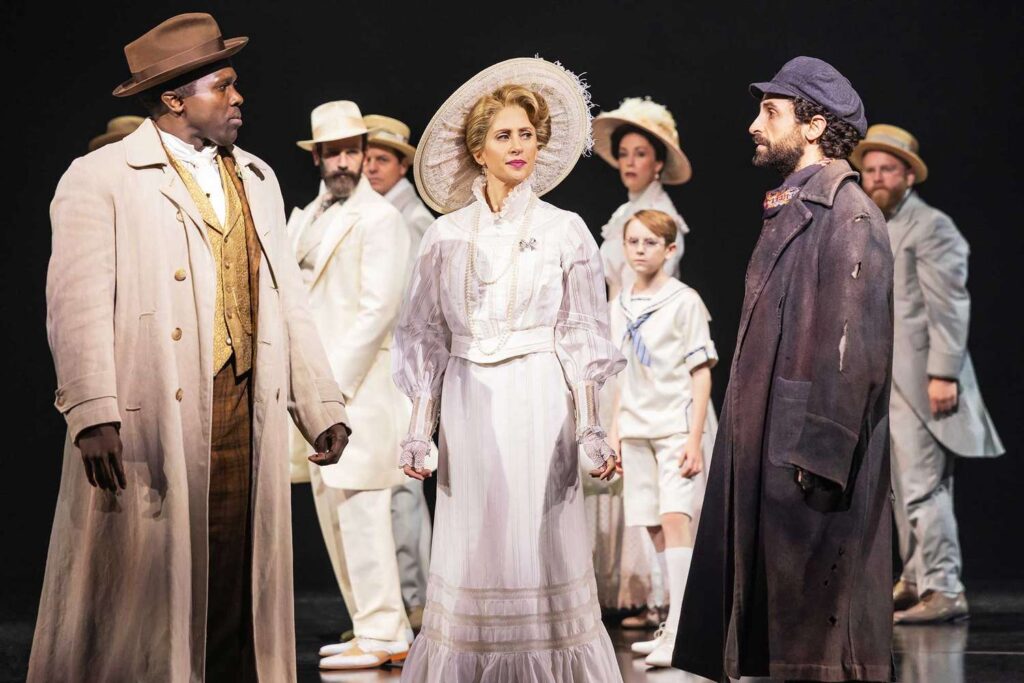America has come a long way since 1975, when E.L. Doctorow’s Ragtime first hit shelves — and longer still since the Progressive era swept through the country in the early 20th century. So it’s reasonable to assume that when the cast of its latest revival takes the stage, a seat at the Vivian Beaumont Theatre will transport its audience into the past. But in fact, Ragtime is painfully connected to the present moment. For all the change and progress we’ve celebrated, America still wilts under the scrutiny of Ragtime‘s critical gaze.
First staged in Toronto in 1996, Ragtime has returned to New York courtesy of the Lincoln Center Theater, this time calling upon the talents of venerated Broadway stars Joshua Henry, Caissie Levy and Brandon Uranowitz to paint a portrait of three 20th century families, striving for the American Dream.
The world of this show is largely defined by those on the outskirts: turn of the century immigrants searching for a safe haven, subjugated Black communities grasping to keep hold of dignity, and then there are the black sheep members of the wealthy white community, searching for meaning and their own kind of freedom. Mother (Levy) begins the play bidding farewell to Father (Colin Donnell), her husband heading out to sea for year’s polar exploration with Admiral Peary. Little does he know that such independence will push her to strip away layers of complacency and uncover the woman she truly wants to be.
Matthew Murphy
Meanwhile, Tateh (a charming Uranowitz) rides a “rag ship” of immigrants arriving in America, with bright dreams of a new and better life for his daughter (Tabitha Lawing). As Tateh and Mother embrace new beginnings, middle-class pianist and composer Coalhouse Walker, Jr (Henry) is seeking a future with his lost love and the mother of his child, Sarah (Nichelle Lewis), who has run off in despair. It’s a cesspool of raw emotion, with both joy and pain lying in wait as these people hinge their hopes on an evolving nation.
With a runtime of 2 hours and 45 minutes, Ragtime isn’t lacking where story is concerned., It’s a sprawling cast, with a plot that spends time on both big, elusive, era-defining figures (Shaina Taub as Emma Goldman! Rodd Cyrus as Harry Houdini!) and everyday people — well-drawn characters taken further by empathetic performances.
Especially in the first act, it’s a pleasure to watch the story take its time unfolding, introducing one compelling figure after the next before bringing them together to forge unexpected connections. Still, some absences weigh heavier than others, especially as some of these performers carry a gravitas that can’t be matched. When Henry is center stage, singing his heart out, blowing our hair back, everything melts away: it’s just Coalhouse, his pain and Henry’s jaw-dropping baritone.
Matthew Murphy
Ragtime culminates with two huge 11 o’clock numbers, from Henry and Levy, a Tony-winner and Olivier-nominee whose names are rightfully big draws to the show. Yet the showstopping vocal moment still fresh in my mind is that of Lewis, who offers a haunting rendition of “Your Daddy’s Son.” Overall the trio of book writer Terrence McNally, composer Stephen Flaherty, and lyricist Lynn Ahrens meet in harmony: the characters connect, the score dazzles and the 28-piece orchestra more than rises to the occasion, accompanied by an ensemble of pitch perfect vocalists.
Under the direction of Lear DeBessonet (Once Upon a Mattress), this Ragtime revival offers a bold, beautiful production, in its best moments bolstered by Adam Honoré’s clever lighting and some effectively deployed projections. But the staging also has a tendency to lean on its gimmicks (the turntable stage, the moving staircases) like crutches, wasting opportunities for sprawling choreography and grounded movement.
There’s a very purposeful blend of sound at work in Ragtime, with the upper-middle class elite bringing European operatic sensibilities to their tones while Coalhouse and his Harlem ilk usher in a sound tinged jaunty and sorrowful, with bold, assertive melodies: ragtime. That contradiction of hope and aching despair goes beyond the music, running right through the roots of the show.
“Where’s the America we were supposed to get?” Tateh at one point laments. Ironically, he eventually finds it. First there’s grief, toil, and disappointment — and then he digs his way out, assimilating in a way that Coalhouse and Sarah could never. He lands the career, the new clothes, the girl, and even their kid.
Matthew Murphy
The jubilation of the finale is hard to swallow. The ensemble sings of hope and brighter days, but the optimism pairs strangely with the backdrop of our present reality. All that sweetness sours on the tongue and in that, Ragtime justifies its return with unfortunately impeccable timing.
Here we have a show that examines where we are as a nation, and just as it did half a century ago, finds us wanting. It asks the very questions that have been front of mind over the past few weeks, months, years. It agonizes over the American Dream, debates the merits of political violence, slams the mistreatment of immigrants, prods at gender inequality, and grapples with grief. It does so while preaching hope for a brighter future — then thrusts its audience into that future, their present, a maddening contradiction. Ragtime isn’t the kind of show you walk out of unscathed, not if you’re really paying attention. Grade: B

